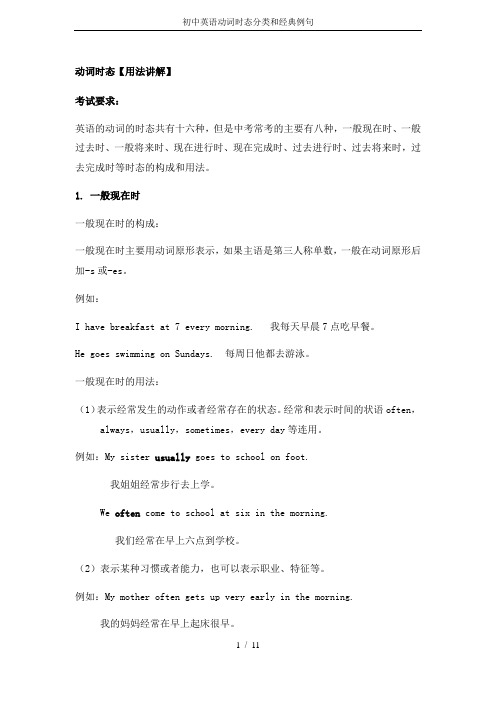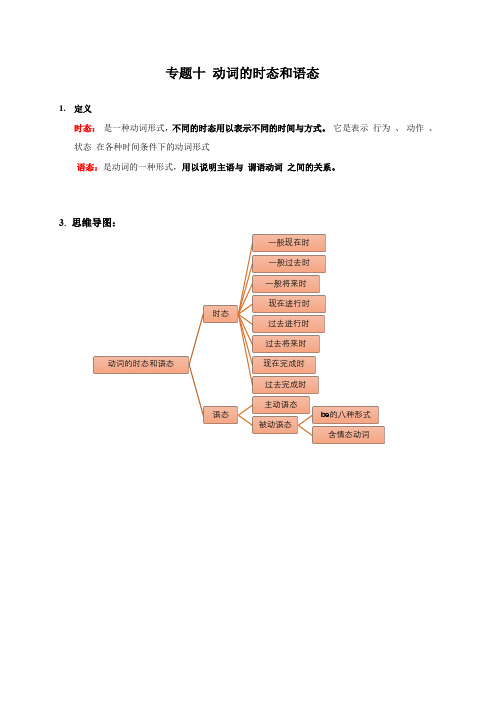初中英语动词时态(教师用)
初一英语上册动词表

初一英语上册动词表1. 动词:be- 现在时:am, is, are- 过去时:was, were- 将来时:will be- 现在进行时:am/is/are being- 过去进行时:was/were being- 现在完成时:have/has been- 过去完成时:had been2. 动词:do- 现在时:do/does- 过去时:did- 将来时:will do- 现在进行时:am/is/are doing- 过去进行时:was/were doing- 现在完成时:have/has done- 过去完成时:had done3. 动词:have- 现在时:have/has- 过去时:had- 将来时:will have- 现在进行时:am/is/are having - 过去进行时:was/were having - 现在完成时:have/has had- 过去完成时:had had4. 动词:go- 现在时:go/goes- 过去时:went- 将来时:will go- 现在进行时:am/is/are going - 过去进行时:was/were going - 现在完成时:have/has gone - 过去完成时:had gone5. 动词:see- 现在时:see/sees- 过去时:saw- 将来时:will see- 现在进行时:am/is/are seeing- 过去进行时:was/were seeing- 现在完成时:have/has seen- 过去完成时:had seen... (请继续按照相同格式列出更多动词)该动词表收录了初一英语上册常见的动词的各种时态形式,方便学生学习并记忆。
请根据需要添加或修改动词,以满足具体的学习要求。
初中英语动词时态分类和经典例句

动词时态【用法讲解】考试要求:英语的动词的时态共有十六种,但是中考常考的主要有八种,一般现在时、一般过去时、一般将来时、现在进行时、现在完成时、过去进行时、过去将来时,过去完成时等时态的构成和用法。
1. 一般现在时一般现在时的构成:一般现在时主要用动词原形表示,如果主语是第三人称单数,一般在动词原形后加-s或-es。
例如:I have breakfast at 7 every morning. 我每天早晨7点吃早餐。
He goes swimming on Sundays. 每周日他都去游泳。
一般现在时的用法:(1)表示经常发生的动作或者经常存在的状态。
经常和表示时间的状语often,always,usually,sometimes,every day等连用。
例如:My sister usually goes to school on foot.我姐姐经常步行去上学。
We often come to school at six in the morning.我们经常在早上六点到学校。
(2)表示某种习惯或者能力,也可以表示职业、特征等。
例如:My mother often gets up very early in the morning.我的妈妈经常在早上起床很早。
This kind of car runs very fast.这种小汽车跑得非常快。
(3)表示客观事实、客观规律或者客观真理。
例如:This kind of trees never grows in the desert.这种树从来不在沙漠里生长。
Do you know that knowledge is power?你知道知识就是力量吗?(4)在时间、条件、让步等状语从句中,表示将来的动作。
例如:They’ll be so happy when I tell them.我告诉他们时,他们会很高兴的。
If you aren’t here on time tomorrow, I’ll write to your parents.如果你明天不准时到,我就给你父母亲写信。
初中英语语法动词时态详解

A.couldn’t he
B.could he
C.didn’t he
D.did he
第七页,编辑于星期六:点 十三分。
三、现在进行时
1.用法:
A.现刻动作:目前正在发生的动作。 B.现阶段动作:目前一个时期一直在进行的
动作,此刻不一定在进行。
2.标志词:now,Look! Listen!
中考模拟:
1.The film began 5 minutes ago. The film_h_a_s _b_e_en__o_n for 5 minutes.
2.They left an hour ago.
They_h_a_v_e_b__e_en__a_w_afoyr an hour.
3.The man died a week ago.
sometimes, never,every day /week /month/year/…
1.The boy usually_g_e_ts(get) to school early.
2.Light _t_r_a_v_e_ls(travel)faster than sound.
第六页,编辑于星期六:点 十三分。
has been
9.They got to know 10 years ago. They____ ______since 10 years ago.
have known
10.I borrowed the book a week ago. I____ _____the book for a week.
They have gone to Europe.
(They are not here.)
第十九页,编辑于星期六:点 十三分。
初中英语语法时态总结

初中英语语法时态总结-CAL-FENGHAI.-(YICAI)-Company One1初中英语语法动词时态总结一、一般现在时1)经常性或习惯性的动作,常与表示频度的时间状语连用。
时间状语:every…, sometimes, at…, on Sunday。
例如:I leave home for school at 7 every morning. 每天早上我七点离开家。
2)客观真理,客观存在,科学事实。
例如:The earth moves around the sun. 地球绕太阳转动。
Shanghai lies in the east of China. 上海位于中国东部。
3)表示格言或警句。
例如:Pride goes before a fall. 骄者必败。
注意:此用法如果出现在宾语从句中,即使主句是过去时,从句谓语也要用一般现在时。
例:Columbus proved that the earth is round. 哥伦布证实了地球是圆的。
4)现在时刻的状态、能力、性格、个性。
例如:I don't want so much. 我不要那么多。
Ann writes good English but does not speak well.安英语写得不错,讲的可不行。
比较:Now I put the sugar in the cup. 把糖放入杯子。
I am doing my homework now. 我正在做功课。
第一句用一般现在时,用于操作演示或指导说明的示范性动作,表示言行的瞬间动作。
第二句中的now是进行时的标志,表示正在进行的动作的客观状况,所以后句用一般现在时。
二、一般过去时1)在确定的过去时间里所发生的动作或存在的状态。
例如:时间状语有:yesterday, last week, an hour ago, the other day, in 1982等。
例如:Where did you go just now? 刚才你上哪儿去了?2)表示在过去一段时间内,经常性或习惯性的动作。
初中英语语法专项8动词的时态和语态

【中考考点】
(1)动词的第三人称单数形式、过去式、过去分词和现在分词的构成。 (2)动词的八种时态的基本结构及用法。 (3)动词的被动语态的基本结构及用法。 (4)动词的主动形式表示被动意义的用法。
动词的时态
考点一 一般现在时
1.结构 一般现在时主要用动词原形表示(当主语是第三人称单数时,谓语动词用第三人称单数形式)。 2.动词的第三人称单数形式变化规则 (1)直接加-s。如:work—works (2)以“辅音字母+y”结尾的词,先变y为i,再加-es。如:carry—carries, cry—cries, try—tries, study—studies (3)以s, x, o, ch, sh结尾的词加-es。如: pass—passes, fix—fixes, go—goes, do—does, teach—teaches, wash—washes (4)特殊:have—has, are—is
动词的时态
考点四 过去将来时
1.结构 would+动词原形 was/were+going to+动词原形 2.用法 表示从过去的某一时刻看,将要发生的动作。 His uncle said that there would be a good harvest the next year.他叔叔说第二年会有一个 好收成。 【注意】 在由if引导的条件状语从句中,如果主句用过去将来时,那么if从句需用一般过去时代替过 去将来时。 If he were here, he would show us how to do it. 如果他在这儿,他就会向我们展示该如何做。
动词的时态
4.动词过去式的变化规则 (1)一般情况下,在动词原形后加-ed。如: watch—watched (2)以不发音的字母e结尾的加-d。如:live—lived (3)以“辅音字母+y”结尾的,变y为i,再加-ed。如: study—studied, carry—carried, cry—cried (4)以重读闭音节结尾,且末尾只有一个辅音字母的,先双写该辅音字母,再加-ed。如: stop—stopped, plan—planned, prefer—preferred (5)不规则动词的过去式需特殊记忆。
初中英语动词时态教案

初中英语语法---时态一、一般现在时:1.概念:经常、反复发生的动作或行为及现在的某种状况以及客观真理。
2.时间状语:always, usually, often, sometimes, every week (day, year, month…), once a week, on Sundays, etc.3.基本结构:①be动词;②行为动词4.否定形式:①am/is/are+not;②此时态的谓语动词若为行为动词,则在其前加don't,如主语为第三人称单数,则用doesn't,同时还原行为动词。
5.一般疑问句:①把be动词放于句首;②用助动词do提问,如主语为第三人称单数,则用does,同时,还原行为动词。
6.动词的第三人称词尾变化:当主语是第三人称单数时,谓语动词需加-s或-es:7. 一般现在时的用法1)表示经常的或习惯性的动作,常与表示频度的副词连用。
常用的频度副词有:always、often、usually、seldom、never。
频度副词在句中通常放在行为动词之前,系动词、助动词之后。
例如: He often goes swimming in summer.他夏天经常游泳。
I usually leave home for school at 7 every morning. 每天早上我七点离开家。
2)表示现在的状态。
例如:My father is at work. He is very busy. 我父亲在工作,他很忙。
The boy is twelve. 这男孩十二岁。
3)表示主语具备的性格、特征和能力等。
例如:All my family love football .我全家人都喜欢足球。
My sister is always ready to help others . 我妹妹总是乐于助人。
4)表示客观真理,客观存在,自然现象。
例如:The earth moves around the sun. 地球绕太阳转动。
初中英语人教版 中考 语法专题 10 动词的时态和语态

专题十动词的时态和语态1.定义时态:是一种动词形式,不同的时态用以表示不同的时间与方式。
它是表示行为、动作、状态在各种时间条件下的动词形式语态:是动词的一种形式,用以说明主语与谓语动词之间的关系。
3. 思维导图:动词的时态和语态时态一般现在时一般过去时一般将来时现在进行时过去进行时过去将来时现在完成时过去完成时语态主动语态被动语态be 的八种形式含情态动词1.动词的时态1.常考的时态构成及用法a.一般现在时d.现在进行时e.过去进行时f.过去将来时g.现在完成时h.过去完成时2. 动词的语态a. 分类:主动语态:表示主语是动作的执行者被动语态:表示并语是动作的执行者c.主动语态和被动语态的转换规则典型例题总分:50分姓名:得分:1.单选题(每小题1分,共50分)( ) 1. Jenny, together with the Greens the White Tower Park if it tomorrow.A.are going to; isn't rainyB.is going to; doesn't rainC.are going to; won't rainD.is going to; isn't rain( ) 2. The old man for quite some time.A.has diedB.dieC.has deadD.has been dead( ) 3. It is reported that a tall building in the city next year.A.will be builtB.were buildC.have builtD.will build( ) 4. My sister for 2 years.A.has marriedB.have got marriedC.has been marriedD.married( ) 5. Chinese ________in many schools around the world and many people love to learn it.A.teachesB.is teachingC.has taughtD.is taught( ) 6. When Tom was in primary school, he ________the piano every day.A.playsB.playedC.was playingD.has played( ) 7. A baby's first month birthday is a special event in China and _____with a special Party.A.celebratesB.is celebratedC.was celebratedD.will celebrate( ) 8. -Were you at home at 9 o'clock last night?-Yes, I a shower at that time.A.tookB.was takingC.was takenD.am taking( ) 9. National Day celebrations for China's seventieth birthday in about three months.A.will be heldB.will holdC.is heldD.was held( ) 10. We don't know if he tomorrow. If he, I will call youA.will come, will comeB.will come, comeses, will comees, comes( ) 11. He told me that he ______ his uncle in Thailand the next day.A.will visitB.has visitedC.is going to visitD.would visit( ) 12. -Tom, do you know ________? -In Beijing.A.where will the 24th Winter Olympics be heldB.where the 24th Winter Olympics will holdC.where the 24th Winter Olympics will be heldD.where will the 24th Winter Olympics hold( ) 13. Peter with his classmates ________ for the bus when the earthquake happened.A.is waitingB.was waitingC.are waitingD.were waiting( ) 14. his museum ________ here for over 80 years. It ________ one of the oldest buildings in this city.A.is; wasB.had been; isC.was; has beenD.has been; is( ) 15. -Mrs. Brown, how long can books from the school library ?-At most two weeks.A.borrowB.keepC.be borrowedD.be kept( ) 16.-An AI robot _____in our school dining hall next term.-I'm looking forward to it.A.will useB.will be usedC.is usedD.was used( ) 17. Usually a baby's face ____ smooth.A.is feelingB.feltC.feels likeD.feels( ) 18. She _____ an English magazine when I came in.A.readsB.has readC.will readD.was reading( ) 19. I will call you as soon as he______ here.A.arriveB.will arriveC.arrivesD.arrived( ) 20. Boys and girl, ______ learning and have fun!A.keepB.to keepC.keepingD.kept( ) 21. There ______a basketball game between these two grades in the gym this afternoon.A.willB.is going to haveC.is going to beD.will have( ) 22. We ______TV from seven to nine last night.A.were watchingB.will watchC.watchedD.watch( ) 23. Jack's mother taught me how ________ Yunnan rice noodles last weekend.A.to makeB.makingC.makeD.to making( ) 24. Mrs. Green said the plates ________ right away,or they would become difficult to wash.A.will be washedB.should washC.will washD.should be washed( ) 25. The documentary Under the Dome (《苍穹之下》)which ________ by Chai Jing showed us that the air pollution in China was very serious.A.producesB.producedC.is producedD.was produced( ) 26. -What did you do last night?- I ________ my homework and watched TV.A.didB.doC.am doingD.will do( ) 27.The hospital is very famous. It _______ in 2001.A.buildsB.builtC.was builtD.is built( ) 28.These rules are made the disabled.A.protectB.protectedC.to protectD.protecting( ) 29. -How much does the TV ?-Not too much. It's just a second-handed one.A.costB.spendC.takeD.pay for( ) 30. -Have you ever ________ an amusement park?- Yes, I have ________ Fun Times Amusement Park last year.A.been to, have gone toB.gone to, have been toC.go to, went toD.been to, went to( ) 31.We are glad to hear that the terrorists ________ by the brave policemen several days ago.A.are caughtB.were caughtC.have been caughtD.are going to be caught ( ) 32. -Why didn't you go to the party last night? - Because I _____.A.wasn't invitedB.didn't invitedC.haven't invitedD.don't invited ( ) 33. -What _____ you supposed ____ when you are in China?- You should shake hands.A.are, to doB.do, to doC.are, doingD.have, to do( ) 34. So far, we ________ English for three years.A.have learntB.learnC.learntD.had learnt( ) 35.The boy was made ______ the words again and again.A.copyB.copyingC.copiesD.to copy( ) 36. The sports meeting in our school now.A.being heldB.is havingC.is holdingD.is being held( ) 37. The window ____ ten minutes ago, and the room is bright now.A.can be cleanedB.is cleanedC.was cleanedD.will be cleaned( ) 38. -Oh, Mrs. King, your necklace looks nice. Is it new?-No, I _______ it for 2 years.A.hadB.have hadC.boughtD.have bought( ) 39. He has ordered a watch on line for his father and it _______ to him before Father's Day.A.sendB.will be sentC.was sentD.sent( ) 40. There ______ a funny cartoon on CCTV 6 this evening.A.willB.will haveC.is going to beD.is going to have( ) 41. -________ did your uncle leave his home town? -He ___________ for nearly twenty years.A.When, has leftB.When, has been awayC.How long, has leftD.How long, has been away ( ) 42. My uncle ________ Germany on business many times.A.has been onB.has gone toC.has been toD.has been in( ) 43. Her life ________ a lot during the last three years.A.changedB.changingC.has changedD.will change( ) 44. -Lisa was seen ______ an old man go across the street this morning. -What a kind girl she is!A.helpingB.helpedC.to helpD.helps( ) 45. My computer has broken down. I'll get it _______ this afternoon.A.repairsB.repairedC.to repairD.repairing。
初中英语知识归纳总结——动词的时态

初中英语知识归纳总结——动词的时态动词的时态(一)教学重点一般现在时在英语中,不同时间里以不同方式发生的动作或存在的状态,要用不同的动词形式来表示,动词的这种不同形式称为动词的时态。
时态从时间上划分,可分为四大类:现在时;过去时;将来时;过去将来时。
从行为上,每一类可以分为四种形式:一般式;进行式;完成式;完成进行式。
这样英语的动词合起来,总共有十六种时态,初中只需掌握其中的八种时态。
1、一般现在时(1)一般现在时表示现在的状态、习惯性的动作或主语所具备的性格和能力等。
①当动词是be时,第一人称用am,第二人称用is,其他人称用are.②当动词是实义动词时,一般用动词原形,但如果主语是第三人称单数时,动词必须用第三人称单数形式,其变化规则如下:助动词do(第三人称单数用does)构成否定句、疑问句及答语,但要注意助动词后原来的谓语动词要恢复原形。
例如:I like music.I don’t like music.Do you like music?Yes, I do No, I don’t(2)一般现在时的用法①表示经常、习惯性动作,常和often, usually, every day, sometimes, always 等时间状语连用。
如:He goes to school by bus every day.They often play football②表示能力、职业、特征。
如:Miss Gao teaches English.Do you speak Japanese?③表示客观存在。
如:The earth moves round the sun.Time and tide wait for no man.④表示已经安排好或计划好的事。
如The plane takes off at 7:30.Classes begin at 8:00⑤在时间状语和条件状语从句中,主句用一般将来时,从句用一般现在时。
- 1、下载文档前请自行甄别文档内容的完整性,平台不提供额外的编辑、内容补充、找答案等附加服务。
- 2、"仅部分预览"的文档,不可在线预览部分如存在完整性等问题,可反馈申请退款(可完整预览的文档不适用该条件!)。
- 3、如文档侵犯您的权益,请联系客服反馈,我们会尽快为您处理(人工客服工作时间:9:00-18:30)。
初中英语分类练习——动词部分【复习目标】▲弄清动词的时态,掌握常用的八种时态。
【课前准备】●在分类记忆动词的基础上,复习八种时态。
【知识要点】英语动词有十六种时态,但初中阶段常用的有八种,即:一般现在时、现在进行时、现在完成时、一般将来时、一般过去时、过去进行时、过去将来时和过去完成时。
一般现在时(一)一般现在时的形式(二)一般现在时的用法1.永恒的真理一般现在时可以用于陈述永恒的真理Summer follows spring.2.“现在时段”一般现在时可以陈述现在时段内发生或存在的事件、动作或情况。
这些事件、动作或情景说不定会无限期的延续下去。
但实际上,我们的意思则是在说“这是现在存在着的状况”。
My father works in a bank.My sister wears glasses.3.习惯性的动作一般现在时可以带时间副词或不带时间副词表示习惯性动作,即不断重复发生的事。
I get up at 7.John smokes a lot.使用带不定频度副词(如:always,never等)或带副词短语(如:every day等)的一半现在时可使习惯性动作表现得更加明确。
I sometimes stay up till midnight.She visits her parents every day.在以How often 开头的问句及答句中,通常用一般现在是:How often do you go to the dentist? – I go every six months.4.表示将来这种用法往往用于谈论时间表、节目单或日程表上所安排好的事情的时候:The exhibition opens on January 1st and closes on January 31st.The concert begins at 7.30 and ends at 9.30.现在进行时(一)现在进行时的形式(二)现在进行时的用法1.说话时正在进行的动作现在进行时表示说话时正在进行的动作或事件。
往往与now, at the moment, just等副词连用,以示强调:Someone’s knocking at the door. Can you answer it ?有人敲门,你去开一下好吗?What are you doing ? —I‘m just tying up my shoe-laces.你在干什么?——我在系鞋带。
He’s working at the moment ,so he can’t come to the telephone.他现在在工作,所以不能来接电话。
现在进行着的动作皆被视为未完成的动作:He ‘s talking to his girlfriend on the phone.他正在和他的女朋友通电话。
可用still 一词强调动作的持续性He’s still talking to his girlfriend on the phone.他仍在和他的女朋友通话。
2.暂时情况现在进行时可用来表示不会长期发生的动作或情况,或被认为在短期内正在进行的动作或存在的状况。
What’s your daughter doing these days ? —She’s studying English at Durham University.你女儿现在在干什么?——她在达勒姆大学学习英语。
这种情况不一定在说话时发生:Don’t take that ladder away. Your father’s using it .别把梯子拿起,你父亲在用哩。
(即不一定现在在用。
)She’s at her best when she’s making big decisions.当做出最大决定时,她处于最佳状态。
暂时发生的事情也可以是在说话时正在进行着:The river is flowing very fast after last night’s rain.昨夜下过雨后,河水流速很快。
现在进行时也用来表示当前的动向:People are becoming less tolerant of smoking these days .如今人们对吸烟较为难以忍受了。
3.事先计划好的动作:指将来现在进行时可表示为将来安排好的活动和事件;除在上下文中意思清楚者外,通常需要一个表示时间的状语:We’re spending next winter in Australia.我们将要在澳大利亚度过明年冬天。
用arrive ,come, go ,leave 等动词的现在进行时描写行程安排,也通常有“将到达”和“将离去”的意思。
He’s arriving tomorrow morning on the 13.27 train.明天早上他将乘13时27分的火车到达。
用现在进行时表示说话时正在进行的动作时,可用状语和上下文使语义不致含混:Look ! The train’s leaving.看!火车开了。
(即火车实际上正在开动)4.重复的动作副词always, constantly ,continually ,forever ,perpetually ,repeatedly 等等可与进行时连用,表示不断重复的动作:She’s always helping people .他经常帮助别人。
某些状态动词带有always 等次也可用进行时:I’m always hearing strange stories about him .我常听说关于他的一些怪事。
当现在进行时表示某事发生的次数过多时,则有时含有抱怨的意思:Our burglar alarm is forever going off for no reason.我们的防盗警报器不知怎么常常失灵。
一般现在时和现在进行时的区别:1 一般现在时和现在进行时常用来解说当时发生的事件,特别是在电台和电视广播中。
在这种情况下,一般现在时常用来表示说话时刚完成的快速动作,现在进行时则常用来描述持续时间较长的动作:MacFee passes to Franklyn, Franklyn makes a quick pass to Booth . Booth is away with the ball ,but he ‘s losing his advantage.麦克菲把球传给富兰克林,富兰克林快传给布恩,布恩带球跑开,但他处境不利。
2 在师范和使用说明中使用一般现在时:一般现在时的这种用法是祈使语气的另一种表示方式。
它说明每一步应该怎样做:First you boil some water .Then you warm the teapot .Then you add three teaspoons of tea .Next ,you pour on boiling water.你先烧些开水,然后把茶壶烫热,接着放三勺茶叶,随后冲入开水…3 内容简介用一般现在时:Kate Fox’s novel is an historical romance set in London in the 1880’s. The action takes place over a period of 30 years …凯特.福克斯的小说是一部以1880年的伦敦为背景的历史传奇。
情节的跨度有30年…4 报刊标题、图片文字说明等用一般现在时和现在进行时:这种一般现在时通常以表示过去发生的事件:FREAK SNOW STOPS TRAFFIC反常的大雪使交通断绝一般将来时一般将来时由助动词shall/will加动词原形构成。
shall(用于第一人称,will用于任何人称。
表示将来某个时间要发生的动作或存在的状态,常与表示将来的时间连用。
如:tomorrow, next week等。
但在表示准备、计划、打算做某事时,常用be going to加动词原形的结构。
如:We're going to see Uncle Wang tomorrow.1) shall用于第一人称,常被will 所代替。
will 在陈述句中用于各人称,在争求意见时常用于第二人称。
Which paragraph shall I read first?Will you be at home at seven this evening?2) be going to +不定式,表示将来。
a. 主语的意图,即将做某事。
What are you going to do tomorrow?b. 计划,安排要发生的事。
The play is going to be produced next month。
c. 有迹象要发生的事Look at the dark clouds, there is going to be a storm.3) be +不定式表将来,按计划或正式安排将发生的事。
We are to discuss the report next Saturday.4) be about to +不定式,意为马上做某事。
He is about to leave for Beijing.注意:be about to 不能与tomorrow, next week 等表示明确将来时的时间状语连用。
一般过去时一般过去时由动词的过去式表示,表示过去发生的动作或状态。
过去式分为规则变化和不规则变化。
一般过去时的构成:a. be动词过去式的句式。
否定句是在was/were后面加not,was not (wasn't)/were not (weren't)。
一般疑问句是把was / were提前并放到句首,要求首字母要大写。
b.实义动词过去式的句式。
①肯定式:主语+动词过去式+其它。
如:They had a good time yesterday.②否定式:主语+did not(didn't)+动词原形+其它。
如:They didn't watch TV last night.③一般疑问句:Did+主语+动词原形+其它?肯定回答:Yes,主语+did.否定回答:No,主语+didn't.如:Did they have a meeting two days ago? Yes,they did. / No,they didn't.④特殊疑问句:特殊疑问词+did+主语+动词原形+其它?如:What time did you finish your homework?一般过去时的用法:①一般过去时的基本用法a)表示过去某个特定时间发生的动作或存在的状态。
